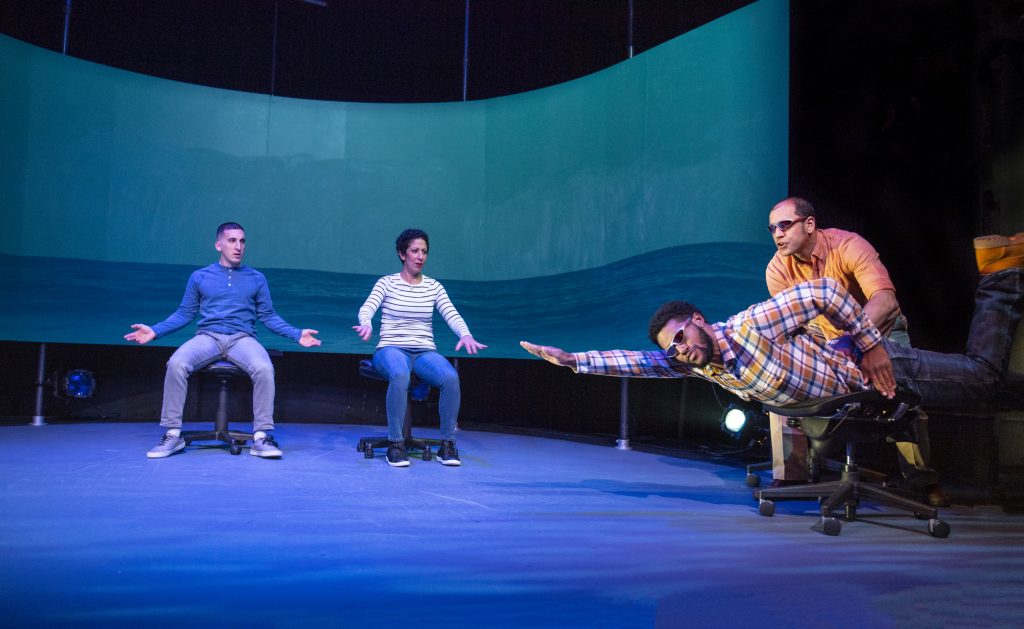13 Dec An Inside Look at WE SWIM and BAPF!
We interview We Swim, We Talk, We Go To War playwright Mona Mansour and PF Artistic Director Amy Mueller about the journey of the play. The play started as an experimental choice for PF’s Bay Area Playwrights Festival 2017, pushing the boundaries of theater and has gone on to receive a rave review from the largest newspaper in San Francisco.
When We Swim was chosen for the Bay Area Playwrights Festival (BAPF) at Playwrights Foundation, what did you think it needed most in terms of development?
Mona Mansour (MM): It’s interesting. I knew, in a weird way, what I wanted the play to say. I knew the dialogue I wanted it to open up with people, but I didn’t quite know how. It’s been a really interesting process because this one—it’s almost like it was a process of trusting my own instinct over and over again about how to tell the story.
.
And what did you hope that BAPF could provide you?
MM: It goes back to putting you in a room with other smart theater makers who are all working on their own stuff [We Swim was developed alongside 5 other plays on the festival]. Many times you are the only workshop that a theater is doing. That’s the logistics of theater, the economics of theater. But [at BAPF] you know that everyone you just spent a weekend with [during the artistic retreat] is going to go back to work on their stuff, there’s something about that that opens up the process for me… there is something intangible that happens when you are around other playwrights working on their own stuff at the same time. I heard advice from another playwright that ended up going in, based on her own life experience, for example. There is something about that kind of camaraderie that you don’t get when it’s just you – alone.
MM: It goes back to putting you in a room with other smart theater makers who are all working on their own stuff [We Swim was developed alongside 5 other plays on the festival]. Many times you are the only workshop that a theater is doing. That’s the logistics of theater, the economics of theater. But [at BAPF] you know that everyone you just spent a weekend with [during the artistic retreat] is going to go back to work on their stuff, there’s something about that that opens up the process for me… there is something intangible that happens when you are around other playwrights working on their own stuff at the same time. I heard advice from another playwright that ended up going in, based on her own life experience, for example. There is something about that kind of camaraderie that you don’t get when it’s just you – alone.
.
So Amy Mueller [PF Artistic Director], what are PF’s goals for plays that go through the development process at the BAPF?
Amy Mueller (AM): Well, and this may seem strange to some, we don’t believe in helping playwrights, or controlling their process. We believe in providing playwrights with tangible, indispensable resources so they can pursue their own artistic agendas – and advance their work to the next level of development – whatever that happens to be in the moment. I see helping as a top-down relationship with the writers, and PF is a sanctuary environment where the playwright is guiding their own process. For Mona that meant digging into the ephemeral aspect of her play — staging swimming… how they might approach that – as it was an essential aspect of the writing and the dramaturgy of the play. They got to experiment with various ideas, and we built a chalk board for them [whoops, no spoilers!]. Experimenting with two of the characters- and who they were in the world also meant some recasting during the process. The actors were extremely game and generous with it. This offered Mona a great gift — something she couldn’t get in production.
.
Mona, in the end, how did you benefit from being a part of BAPF?
MM: What it did for me was that it allowed me to do this work and then have Golden Thread—have Torange Yeghiazarian, the Artistic Director there—come and see the fruits of our labor – on its feet – which gave her inspiration and confidence as a producer. And, it gave me a really good foundation in the workings of the play. There were things that in those initial days were really affirming. Plus, working within the context of a festival meant that there were a great group of directors there [working on 5 other plays]. It was also important to have the continuity of having people like Jayne Wenger [Director of Artistic Process for BAPF] in the room. People don’t realize that it’s emotional, putting this stuff out into the world. And, in a festival like BAPF, you have people in your corner who aren’t partisan to any particular institution. They just love the play and they want it to do well. Who doesn’t need that?
.
Amy, in your eyes, what are the qualifying factors for a BAPF play?
AM: We seek, above all, a singular voice spitting truth. Plays and playwrights that are getting the audience to think about social and political issues that are very current, or, in the case of a historical piece, are somehow reflecting the zeitgeist of our time,. Plays that are bigger than the sum of their parts. PF is particularly focused on moving our field forward with new voices that are transforming what theater can be, and who can participate, and whose stories are told. We Swim is a quintessential example of our artistic aesthetic.
.
Is there anything in particular you want to tell people about We Swim?
AM: I strongly encourage folks to see this play. It’s a great night of theater, and I think its a really important play. It speaks to audiences from a very personal point of view about issues in our lives around family, waging war, and choices we make. It brings up familial relationships and how incredibly difficult it is to have meaningful and substantive conversations with a family member – especially between generations. How difficult it is to be open to a trusting relationship when your points of view are widely divergent. It beautifully unpacks a model of how two family members might engage in a meaningful conversation without risking the actual relationship.
.
We Swim closes this weekend, December 16.
Don’t miss it.
Tickets are available for this weekend’s performances here.



No Comments